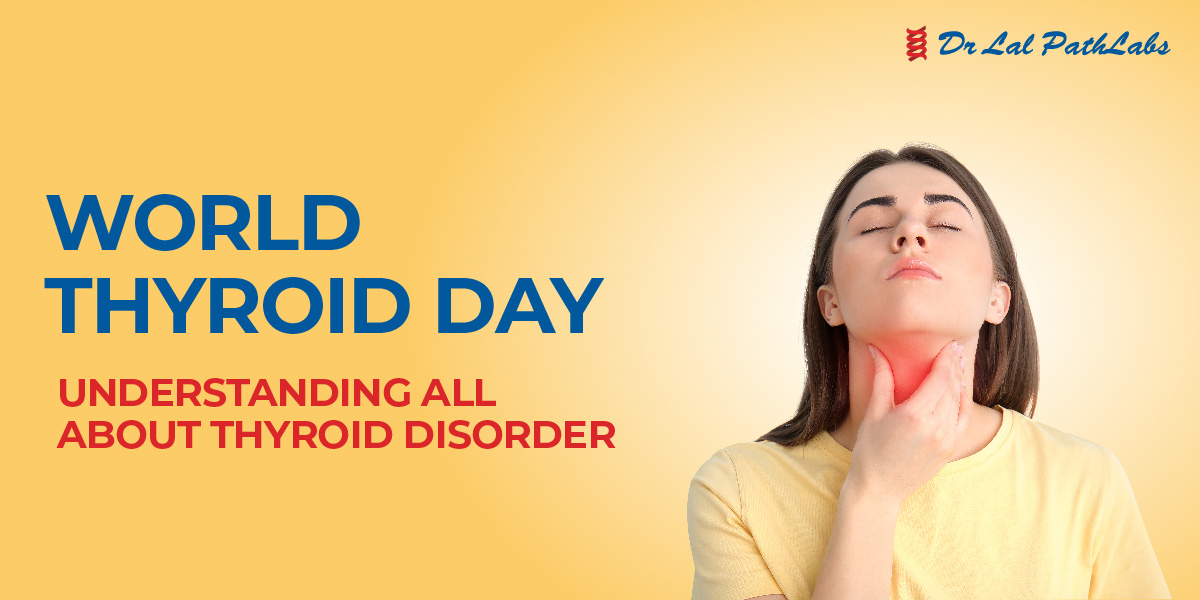Thyroid Disease: Symptoms, Types & Diagnosis
What is a thyroid?
The thyroid is a small, butterfly-shaped gland in the front of your neck, wrapped around the windpipe. It makes hormones that control many important body functions, such as breathing, heart rate, weight, digestion, and mood.

What is thyroid disease?
Thyroid disease is a medical condition that keeps the thyroid from making the right amount of hormones.
What causes thyroid disease?
Thyroid disease can be due to other diseases that impact the way the thyroid gland works.
Conditions that can cause hypothyroidism include:
- Thyroiditis
- Hashimoto’s thyroiditis
- Postpartum thyroiditis
- Iodine deficiency
- A non-functioning thyroid gland
Conditions that can cause hyperthyroidism include:
- Graves’ disease
- Nodules
- Thyroiditis
- Excessive iodine
What are the types of thyroid disorders?
There are various forms of thyroid disorders:
- Hyperthyroidism: It occurs when your thyroid gland makes more thyroid hormones than your body needs.
- Hypothyroidism: It occurs when your thyroid gland does not make enough thyroid hormones.
- Thyroid Cancer: There are four main types of thyroid cancer: papillary thyroid cancer, follicular thyroid cancer, anaplastic thyroid cancer and medullary thyroid cancer.
- Thyroid nodules: These are small, noncancerous growths which start in the cell layer that lines the inner surface of the thyroid gland.
- Thyroiditis: The swelling in the thyroid gland is called thyroiditis
What are the symptoms of thyroid disease?
You may experience various symptoms if you have thyroid disease. The symptoms of a thyroid condition are very similar to those of other medical conditions.
The symptoms of thyroid disease can be divided into two groups:
Symptoms of Hypothyroidism
- Feeling tired
- Gaining weight
- Experiencing forgetfulness
- Having frequent and heavy menstrual periods
- Having dry and coarse hair
- Having a hoarse voice
Symptoms of Hyperthyroidism
- Losing weight
- Experiencing anxiety, irritability and nervousness
- Having trouble sleeping
- Having an enlarged thyroid gland
- Feeling sensitive to heat
- Having vision problems or eye irritation
How is thyroid disease diagnosed?
Thyroid disease is difficult to diagnose because its symptoms are easily confused with other conditions. The tests that can help determine if you have thyroid disease or not are:
Blood tests: They tell if your thyroid gland is functioning properly by measuring the amount of thyroid hormones in the blood. The specific blood tests done to test the thyroid include:
- Thyroid-stimulating hormone (TSH): TSH is produced in the pituitary gland and regulates the levels of the thyroid hormone in the blood. Thyroid hormone deficiency is associated with an elevated TSH level, while thyroid hormone excess is associated with a low TSH level.
- T4 (Thyroxine): Low T4 is seen with hypothyroidism, whereas high T4 levels may indicate hyperthyroidism.
- T3 (Triiodothyronine): Low T3 levels are associated with hypothyroidism and elevated T3 levels are associated with hyperthyroidism.
- FT4 (Free T4) and FT3 (Free T3): The hormones are bound to a protein due to which the total measurement may not be accurate, thus it is recommended to measure the levels of free T3 & free T4 hormones.
Imaging tests: A thyroid scan is done to look at your thyroid to check for increased size, shape, and growth.
Physical exams: A physical exam is done by the doctor to check for any growth or enlargement of the thyroid.
How is thyroid disease treated?
Treatment options for Hyperthyroidism
- Anti-thyroid drugs
- Radioactive iodine
- Beta-blockers
- Surgery
If your thyroid is removed with surgery or destroyed with radioactive iodine, then your doctor may suggest you to take thyroid hormone replacement pills for a lifetime.
Treatment options for Hypothyroidism
Hypothyroidism can be managed by continuously taking medication to normalize the hormones in your body. The dose of the medication may change over time as your symptoms.
Frequently Asked Questions
1. What problems can the Thyroid cause?
Thyroid disorders can affect heart rate, mood, energy level, metabolism, bone health, pregnancy,
2. Can thyroid be treated?
All thyroid conditions can be treated, but it requires being on continuous medication and maintaining a normal thyroid state.
3. What food controls the thyroid?
There are certain foods that can help normalize thyroid hormones:
Foods you should eat if you have hypothyroidism:
- Roasted Seaweed
- Salted nuts
- Baked fish
- Dairy
- Fresh eggs
Foods you should eat if you have hyperthyroidism:
- Dairy products
- Orange juice
- Chicken
- Turkey Beans
- Nuts
- Kale
- Radishes
- Brussels sprouts
4. What is a normal thyroid level?
Following are the normal thyroid levels:
- Free T3: 2.30 – 4.20 picograms per deciliter (pg/dL)
- Free T4: 0.89 – 1.76 ng/dl
- TSH Ultrasensitive: 0.550 – 4.780 µIU/mL
5. What are the symptoms of thyroid disease in females?
Symptoms of hypothyroidism in women are:
- Fatigue
- Cold intolerance
- Weight gain
- Constipation
- Hair loss
- Skin dryness
- Nail changes
- Irregular menstrual cycle
Symptoms of hyperthyroidism in females:
- Unintentional weight loss
- Rapid or irregular heartbeat
- Feeling of anxiety
Disclaimer:
This blog is for informational purposes only and should not be construed as advice or as a substitute for consulting a physician. It is not a substitute for medical advice or treatment from a healthcare professional.













